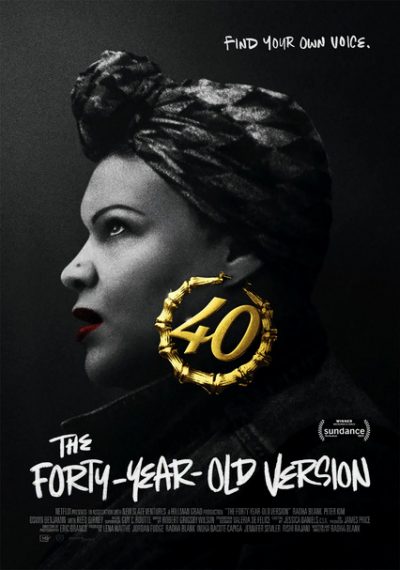
“The Forty-Year-Old Version”(2020). Cast: Radha Blank, Peter Y. Kim, Oswin Benjamin, Imani Lewis, Haskiri Velazquez, Antonio Ortiz, TJ Atoms, Reed Birney, Andre Ward, Jacob Ming-Trent, Welker White, Stacey Sargeant, William Oliver Watkins, Ashlee Brian, Meghan O’Neill. Director: Radha Blank. Screenplay: Radha Blank. Web site. Trailer.
Waiting for our life to be fulfilling can be a frustrating exercise. We know we have something to say and goals we’d like to accomplish, yet, for whatever reason, things just never seem to materialize. We’re thus likely to sit back in bewilderment, unable to understand why nothing comes together. But, rather than spin our wheels and waste our time in unproductive speculation, we might be better off focusing our introspection on the root cause of the issue – us. Taking stock of our authentic selves and figuring out what it is we were truly meant to do could prove more revealing, as an exasperated middle-aged woman discovers for herself in the insightful new comedy, “The Forty-Year-Old Version.”
Thirty-nine-year-old African-American playwright Radha Blank (Radha Blank) feels unsatisfied. A decade earlier, she had been named a rising star in the New York theater community, becoming one of the city’s distinguished “30 Under 30.” Since then, though, her career has languished; much of her work has gone unproduced, forcing her to take a job teaching playwriting to high school students (and a rather surly and salty crew of pupils at that). Her romantic life is in something of a slump, too, her greatest thrill coming from vicariously listening to her neighbors make love through her bedroom walls. And, to make matters worse, Radha’s mom, an educator and painter, passed away not long ago, a death that weighed heavily on her. So now as she approaches 40 and begins to feel her age, she wonders if she’ll be able to get her life back on track while she still has the chance, hoping in particular to avoid the pitfall of failed potential that befell her talented but underappreciated mother.
Radha is not without her backers, though. First, there are her students, particularly Waldo (Antonio Ortiz) and Kamal (TJ Atoms), a pair of lovable, albeit oversexed, goofballs; Rosa (Haskiri Velazquez), a streetwise Latina lesbian who openly professes to have an unrequited crush on her teacher; Elaine (Imani Lewis), a talented diamond in the rough in need of discipline and an attitude adjustment; and Avery (Ashlee Brian), a Don Juan wannabe with a thing for older women, Radha included. Then there’s Archie (Peter Y. Kim), Radha’s longtime friend and agent, a flamboyantly gay, middle-aged Korean go-getter who does everything he can to support her projects, even when his time might be better spent promoting other more promising clients.
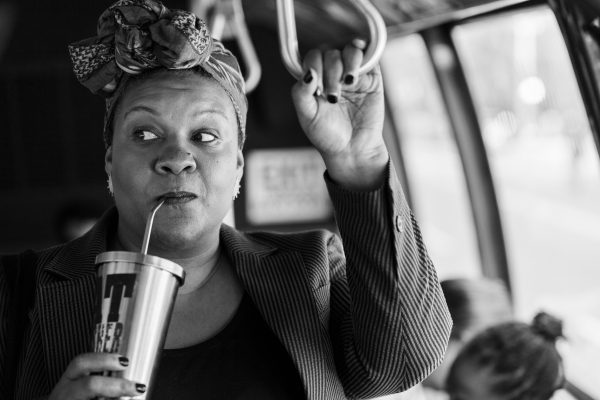
Radha’s indeed fortunate to have such enthusiastic supporters behind her, if for nothing else than providing much-needed moral support when circumstances go awry. And the need for that moral support comes up often as she seeks to stage her new play, Harlem Ave. She first approaches Forrest (Andre Ward), the eccentric, enigmatic head of a Black theater company who seems more preoccupied with consulting spirits than doing serious work. Moreover, given the shoestring budgets he generally operates with, the prospects don't look promising, leaving Radha discouraged yet again.
All is not lost, however. Archie invites Radha to a cocktail party with a number of heavy-hitters in the theater community, most notably Josh Whitman (Reed Birney), a colorful, influential, self-important, though often-clueless producer. Archie informs Radha that Whitman is open to new production ideas and that the party may be the perfect opportunity to make a pitch. But, when Radha and Whitman discuss the possibilities, the conversation doesn’t go well (to say the least), leaving her back at square one.
Disheartened, Radha believes that her career as a playwright could be over. It’s time to reinvent herself, and she taps into the anger and frustration she’s been feeling as a springboard. She draws upon those emotions to begin composing rap lyrics, as told from the perspective of a single, plus-sized, economically challenged, “under-serviced” Black woman, and she likes what she comes up with. This could be the start of a whole new career. There’s just one catch: she needs the beats to go with her words. But, thanks to a promising lead, that problem could be solved soon, too.
Radha pays a visit to the apartment of beats creator “D” (Oswin Benjamin), a perpetually stoned, twenty-something man of few words who’s a virtuoso at what he does best. Radha and D don’t hit it off well at first, but, when she sees what his beats do for her lyrics, she sees their collaboration as a good fit. Likewise, D soon becomes impressed with Radha – and for more than just her lyrics. He’s anxious to help showcase her work, and he quietly looks for an opening with her in other ways, too.
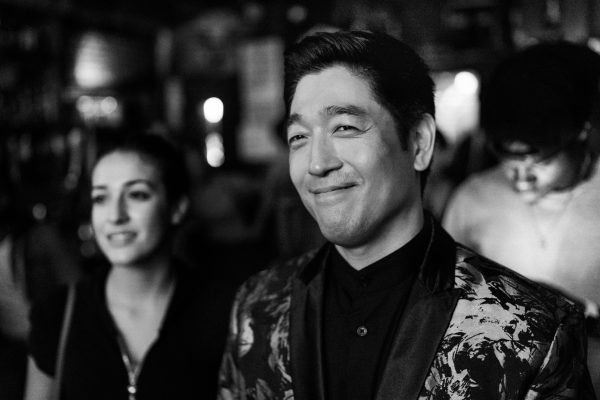
Unfortunately, thanks to a bit too much pre-performance nerve-settling reefer, Radha’s rap premiere at a club night organized by D proves to be a disaster. After the failed effort, she seeks solace in Archie’s comforting arms, asking herself, “What was I thinking?” Archie provides the requisite reassurance, informing her that, despite her ill-fated meeting with Whitman, the producer is willing to consider giving Harlem Ave. a second look. It’s a chance for Radha to leave her rap experiment behind and go back to what she knows best, an opportunity she willingly pursues.
Upon meeting with Whitman, however, Radha learns that he’s looking to implement a number of alterations to make the play more marketable to theater patrons, such as adding a principal White character (Meghan O’Neill) to a production that originally featured only two African-American leads (Stacey Sargeant, William Oliver Watkins). He also makes promises that he’s unable to keep; instead of fulfilling Radha’s request that he hire a Black director (they’re all already working, he claims), he finds a replacement in a Jewish White woman, Julie (Welker White). And, as the compromises continue to creep into the production, Radha grows increasingly disillusioned.
Fortunately, Radha has a knight in hip hop armor come to her rescue. When D wonders where she disappeared to after her on-stage meltdown, he comes in search of her. And, when he does, the man of few words uncharacteristically speaks his mind, contending that Radha is selling out for the sake of seeing her play produced. He takes it upon himself to immerse her in the rap community, to help her see a world in which he believes she truly belongs. It doesn’t hurt that he then satisfies some of her other long-simmering needs. Indeed, everything he does works wonders to lift her spirits.
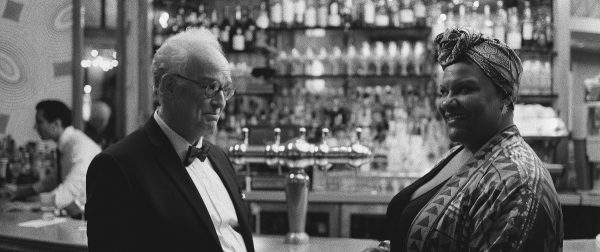
But this leaves Radha with a huge dilemma to resolve. Does she continue to work on the radically altered production of Harlem Ave., especially since it now means having to address some additional disagreeable obligations in exchange for the play’s staging? Or does she pursue a revitalized rap career with D, one whose potential and prospects are unknown? It’s a big decision, and, with her 40th birthday right around the corner, she doesn’t have much time to choose if she’s to stick to the timetable she set for herself. It seems she’s got some heavy thinking to do.
To a great degree, that heavy thinking begins with a fairly simple question – What does Radha want to create for herself? As simple as that may seem, however, it may not be an easy question to answer. It requires peering within, taking a good hard look at our true selves, particularly what we believe about ourselves. And that’s important, because what we believe about ourselves, in turn, is reflected in the reality we experience. Such is the core principle driving the conscious creation process, the philosophy that maintains we manifest the existence around us through the power of our thoughts, beliefs and intents.
In making this happen, we invariably have the support of backers behind us. In Radha’s case, that’s apparent in the many people who encourage her to fulfill her dreams. But she also has another powerful, if less obvious supporter in her corner (even if she doesn’t recognize it as such) – our divine collaborator (God, Goddess, All That Is, the Universe, Source or whatever other name best suits you). That collaborator helps to make happen what we seek, and it does so in a supremely loving and supportive way. In fact, in conscious creation terms, it’s often said that “the Universe leans in our direction.” What better assistance could we ask for?
Of course, in making that happen, we must be clear with ourselves and our collaborator about what we truly want. That calls upon us to be authentic with ourselves, to tap into our sense of personal integrity. And clearly this is something Radha struggles with. Is she a playwright who’s ever willing to make compromises to get her productions staged, even if they go against the principles she stands for? Or is she an emerging rapper who speaks her mind through her candid, no-holds-barred lyrics? Only she can decide.
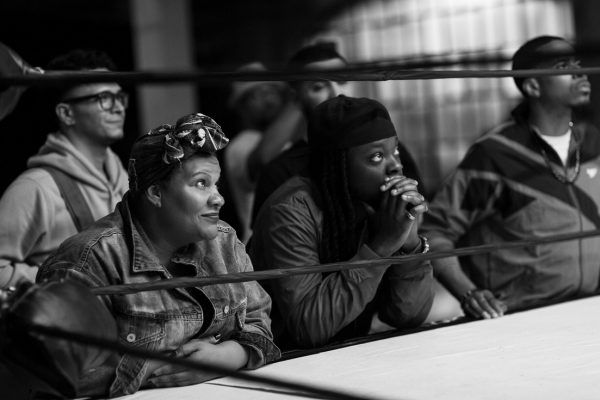
However, as noted previously, she’s not without help in making that decision. Those around her have an uncanny knack for pointing the way toward what she should consider and what she should ignore. D, for example, despite his reluctance to speak up, is an ardent supporter, nudging Radha to listen to her heart and encouraging her to follow what she knows deep down inside is the right course – striking out in a new direction with her singular rap style. The same can be said for her students, all of whom think it’s rad that they have a teacher who is so cool that she’s willing to take such a chance. Even the homeless man (Jacob Ming-Trent) who has taken up residence across from Radha’s apartment building is behind her in his own way, routinely offering colorful, unsolicited guidance on what she should do, acting almost as if he were a sort of latter-day one-man Greek chorus.
At the same time, Archie, and, by extension, Whitman, Julie and everyone associated with the Harlem Ave. production, provide their own special form of backhanded guidance. They’re all eminently enthusiastic about the play as Radha grows ever more disillusioned about it. In a sense, through their continued backing of the play, they feed Radha’s feelings and beliefs that she may be on the wrong path. The question is, of course, can she see that? Can she indeed realize what they’re trying to push her to do?
These various supporters are all the work of Radha’s divine collaborator trying to help her attain clarity on what decision to make. Opportunities on each front arise, and individuals in each camp are there to help steer their pending realizations into being. These seemingly perfectly coordinated “coincidences” – these synchronicities – are designed to help show Radha the way, to help her deduce which path she should follow, the one that’s ultimately most in line with the qualities of her true, authentic self. However, the key consideration here is, can she recognize these signposts for what they are?
All of this, in the end, is an attempt by Radha and her divine partner to help her realize her own brand of value fulfillment, the conscious creation concept associated with being our best, truest selves for the betterment of ourselves and those around us. In a sense, it’s an initiative aimed at helping us to discover our destiny, our reason for being. Would Radha be of better service to the world by being the figurehead of a production that has been significantly altered with watered down versions of the messages she’s trying to convey? Or would she have greater impact by willingly pursuing a career as a rap artist whose words speak for those who have never been given voice to their issues and concerns? Again, there’s a big choice involved here, but, if Radha puts her mind to it, with all of the loving, well-intentioned urging that has come her way, she just might make the decision that best benefits herself and others.
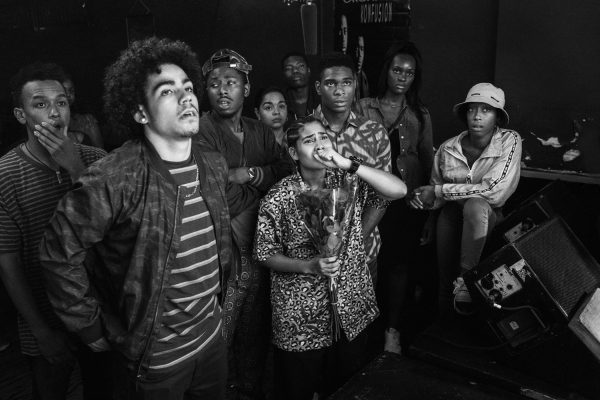
Even though the foregoing plot summary and discussion may make this sound like a deep, philosophical treatise, nothing could be further from the truth, despite the presence of these themes in the picture’s narrative. “The Forty-Year-Old Version,” a title that’s a play on words on the 2005 release “The 40-Year-Old Virgin,” is one of the most consistently funny offerings to have come out in years, serving up brilliant, laugh-out-loud one-liners and hilarious (and I do mean hilarious) situational comedy in rapid-fire succession throughout its two-hour runtime. And, when the story turns thoughtful, the picture knows how to deliver the goods then as well, but it does so without unduly letting them overstay their welcome. Writer-actor-director Radha Blank’s debut semi-autobiographical feature is a real treasure in so many regards that it’s the kind of movie viewers will remember vividly well after the fact. The film presents its material with a refreshing honesty, offering poignant insights about the New York arts community, society at large, being authentic and growing older. Shot mostly in black and white, the film’s gorgeous cinematography beautifully enhances the narrative and shows off the Big Apple in its best light. The narrative becomes admittedly a little stretched out in the second hour, but, with everything else the picture has to offer, who cares? Sensitive viewers are cautioned that the salty language in this one is enough to make a sailor blush, but it only serves to make the laughs even bigger throughout. Blank is off to a tremendous start with this project; let’s hope she keeps it up in future releases. The film is available for streaming online.
“The Forty-Year-Old Version” has scored big with critics, and it has earned a modest degree of attention in this year’s awards competitions (though it deserves more than it received). As one of the National Board of Review’s Top 10 Films of 2020, the picture also captured the organization’s Spotlight Award for Blank’s outstanding achievements with this project. Blank herself has been recognized with a BAFTA Award nomination for best actress, a very deserving honor indeed. In addition, the picture received a nod in the best comedy category of the Critics Choice Awards contest and an Independent Spirit Award nomination for best first feature.
Reaching for the stars is certainly a noble ambition, but we need to make sure we’re grasping for the right ones if we ever hope to feel genuinely fulfilled. Certain pursuits may sometimes feel right, but, when we can see that our efforts aren’t bearing any fruit, it may be time to step back and reassess. We might resist such changes at first, probably because we’re unwilling to admit that the time we spent chasing the wrong goals was a mistake. However, such undertakings – no matter how little success they bring us – are rarely a waste of time. They help us better get in touch with what we were meant to do, ventures that are likely to deliver more satisfying rewards. It may take fashioning a different version of ourselves to reach that point, but, when we consider what’s at stake, the effort is worth it. And, with a sound plan and a good measure of commitment, we just might make it by the time we’re 40.
Copyright © 2021, by Brent Marchant. All rights reserved.

No comments:
Post a Comment